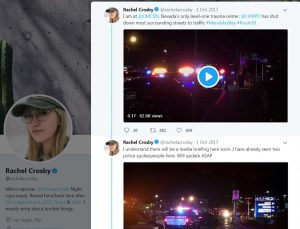
Reporters everywhere increasingly must cover mass violence and other chaotic situations, and should make a plan before any news erupts, the Las Vegas Review-Journal’s Rachel Crosby told attendees at Health Journalism 2018.
Whether it’s a mass shooting, disease outbreak, natural disaster or other major event – take time now to figure out how your newsroom would report on it and how you can be best prepared, Crosby, a former crime reporter now on the metro desk, said at AHCJ’s annual conference in Phoenix.
Crosby shared the insights she gained covering the Oct. 1, 2017, mass shooting at a concert in Las Vegas near the Mandalay Bay resort. She described the chaos that night as she staked out one of the city’s trauma centers and helped her team piece together the scale of the shooting and the carnage. (Read the Review-Journal’s coverage of the shooting here.)
Panic, shock and fear can quickly come over you, she said, and it helps to have a framework already in place to help get out and report on such an incident.
One key is to start developing sources so you have relationships in place before you are scrambling, something that can also help give local reporters an advantage, she said. Working on features or other related stories before disaster strikes can help build in reasons to reach out to important contacts, Crosby added. Also, take steps to further relationships with sources you already have to help boost trust in each other, she added.
In the midst of chaotic events, journalists will find themselves reporting horrific news that can be hard to send out, such as when she confirmed the Las Vegas shooting had caused significant deaths, Crosby said.
“This is information that people need,” she said. “It sucks, but it’s your job.”
For reporters themselves, Crosby urged them to plan to be gone for a while with snacks, water and supplies for long stretches in the field. Make your personal safety and that of your colleagues a priority, she told AHCJ members.
Separately, Banner Health Chief Clinical Officer Dr. Marjorie Bessel said the nonprofit health care system spends a lot of time planning for various scenarios to be as prepared as possible under a wide range of possible circumstances. “You need it to be a natural instinct,” and that comes with preparedness, she added.
Banner’s officials consider scarcity of resources as well as staffing and licensing issues, Bessel said at the April 14 panel, “Finding organization in the chaos of mass violence.” They also weigh environmental factors such as extreme heat in possible outdoor triage situations and potential communications problems such as overloaded cell phone towers, she added.
The challenges go beyond mass violence, Bessel said, noting the 2017 solar eclipse and disease outbreaks can also cause health officials to enact emergency response protocols. Health care systems also constantly train and revise their plans, she added.
For Crosby, however, such plans also need to be questioned both before and after any tragedy strikes. Some other tips from her:
- Be clear and concise in any communications seeking more information from officials
- Recognize that it will likely take longer for your sources to get back to you with information
- Be open to the different ways trauma could affect you personally and seek ways to help yourself
- Try to connect with other journalists who have had to cover similar events
- Take advantage of any resources offered by your newsroom, including therapy dogs, counselors and other professionals
- Before tragedy strikes, check with state and local authorities about any emergency plans that have been filed by hospital systems and others (for examples, casinos in Las Vegas)
- For follow up stories, read trade publications, search out possible personal essays, and follow GoFundMe pages to connect with survivors and their families; also check after-action reports filed by local officials and agencies after shootings and other emergencies
- Audience tips included bringing extra batteries/power sources and keeping a chronology with your notes that includes dates and times to help when questioning authorities and writing follow-up pieces.




